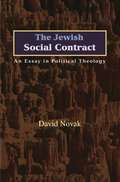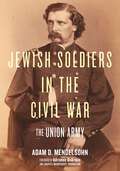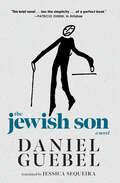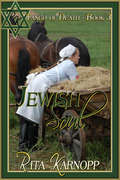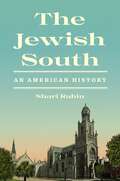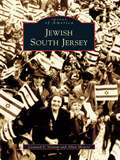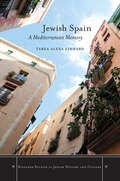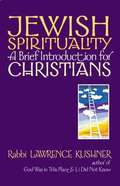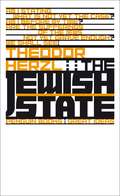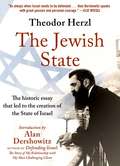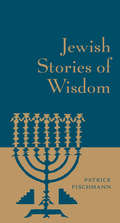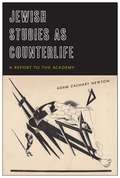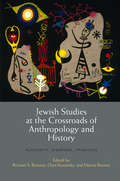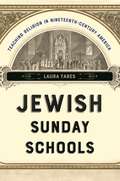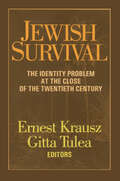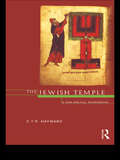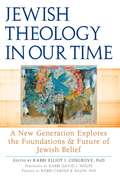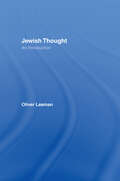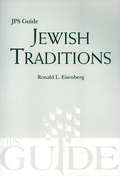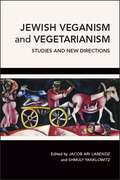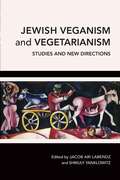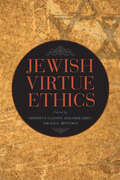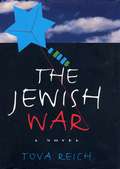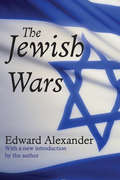- Table View
- List View
The Jewish Social Contract: An Essay in Political Theology (New Forum Books #39)
by David NovakThe Jewish Social Contract begins by asking how a traditional Jew can participate politically and socially and in good faith in a modern democratic society, and ends by proposing a broad, inclusive notion of secularity. David Novak takes issue with the view--held by the late philosopher John Rawls and his followers--that citizens of a liberal state must, in effect, check their religion at the door when discussing politics in a public forum. Novak argues that in a "liberal democratic state, members of faith-based communities--such as tradition-minded Jews and Christians--ought to be able to adhere to the broad political framework wholly in terms of their own religious tradition and convictions, and without setting their religion aside in the public sphere. Novak shows how social contracts emerged, rooted in biblical notions of covenant, and how they developed in the rabbinic, medieval, and "modern periods. He offers suggestions as to how Jews today can best negotiate the modern social contract while calling upon non-Jewish allies to aid them in the process. The Jewish Social Contract will prove an enlightening and innovative contribution to the ongoing debate about the role of religion in liberal democracies.
Jewish Soldiers in the Civil War: The Union Army
by Adam D. MendelsohnOffers an engaging account of the experiences of Jewish soldiers in the Union Army during the Civil WarWhat was it like to be a Jew in Lincoln’s armies? The Union army was as diverse as the embattled nation it sought to preserve, a unique mixture of ethnicities, religions, and identities. Almost one Union soldier in four was born abroad, and natives and newcomers fought side-by-side, sometimes uneasily. Yet though scholars have parsed the trials and triumphs of Irish, Germans, African Americans, and others in the Union ranks, they have remained largely silent on the everyday experiences of the largest non-Christian minority to have served.In ways visible and invisible to their fellow recruits and conscripts, the experience of Jews was distinct from that of other soldiers who served in Lincoln’s armies. Adam D. Mendelsohn draws for the first time upon the vast database of verified listings of Jewish soldiers serving in the Civil War collected by The Shapell Roster, as well as letters, diaries, and newspapers, to examine the collective experience of Jewish soldiers and to recover their voices and stories. The volume examines when and why they decided to enlist, explores their encounters with fellow soldiers, and describes their efforts to create community within the ranks. This monumental undertaking rewrites much of what we think we know about Jewish soldiers during the Civil War.
The Jewish Son: A Novel
by Daniel GuebelA breathtaking short novel about the complicated feelings of hate and pity in familial love by an acknowledged Latin American master.A brilliant and dark tour de force, Jewish Son presents the delicate archeology of the stubbornness of a boy who demands his parents&’ attention. It is a brutal confession of the lies necessary to win a space of approval in a troubled family, a treatise on the excesses of love and the paradoxical lack of affection that is never enough, an accomplished narration of childhood from the point of view of the adult gaze, and a rewriting of Kafka&’s Letter to His Father.As his father&’s imminent death becomes an ever more concrete reality with surgeries, caregivers, sedatives and his mother grows obsessed with visits to the rabbi and amasses saint cards and Buddhist prayers, the narrator evokes the remnants of the rejection that pervaded his childhood.Without yielding to the idealization of youth or to the delight in pain before physical decay and death, Guebel dissects, beautifully although with discomfort, his very early conversion to the dream of literature as an act of reparation.
Jewish Soul (Tango of Death #3)
by Rita KarnoppMayla Sucuri’s world is falling apart . . . no Gypsy is safe in Hitler’s Germany. Her twin sister, Vanya, has just run off with her love and joined the partisans. Now Mayla is being forced to leave her papa and younger sister, Zilka, with the kumpania. Heading to Switzerland with her mother, to the safety of her Grandmother’s chalet in Switzerland, Mayla fears she’ll never see any of them again. Her grandmother is connected to every high official in the SS. But not everything is as it appears. Because of her drive to be a doctor, Mayla finds herself invited to Dachau and Auschwitz. She quickly finds herself in the company of Doctor Josef Mengele and Doctor Sigmund Rascher, who are only too willing to share the results of their medical experiments on Jews and Gypsies. At great personal risk, Mayla refuses to turn down the opportunity to take notes and bear witness to the atrocities happening at the concentration camps. Mayla is drawn to Auschwitz where the distinctions between good and evil become blurred in a world turned upside down. Will it get her killed or will her unwavering resolve give her the strength and courage to rescue her sisters from the gas chambers?
The Jewish South: An American History
by Shari RabinA panoramic history of the Jewish American South, from European colonization to todayIn 1669, the Carolina colony issued the Fundamental Constitutions of Carolina, which offered freedom of worship to &“Jews, heathens, and other dissenters,&” ushering in an era that would see Jews settle in cities and towns throughout what would become the Confederate States. The Jewish South tells their stories, and those of their descendants and coreligionists who followed, providing the first narrative history of southern Jews.Drawing on a wealth of original archival findings spanning three centuries, Shari Rabin sheds new light on the complicated decisions that southern Jews made—as individuals, families, and communities—to fit into a society built on Native land and enslaved labor and to maintain forms of Jewish difference, often through religious innovation and adaptation. She paints a richly textured and sometimes troubling portrait of the period, exploring how southern Jews have been targets of antisemitism and violence but also complicit in racial injustice. Rabin considers Jewish immigration and institution building, participation in the Civil War, the 1915 lynching of Leo Frank, and Jewish support for and resistance to the modern fight for Black civil rights. She examines shifting understandings of Jewishness, highlighting both the reality of religious diversity and the ongoing role of Christianity in defining the region.Recovering a neglected facet of the American experience, The Jewish South enables readers to see the South through the eyes of people with a distinctive religious heritage and a southern history older than the United States itself.
Jewish South Jersey (Images of America)
by Allen Meyers Leonard F. VernonInitial Jewish settlements in South Jersey emerged in the mid-19th century and offered a safe haven for people to re-create strong families and practice religion freely, without fear of government-sponsored violence. Looking for work, German Jews first migrated from their community in Philadelphia to Trenton, and then spread south to Wildwood. Although Jewish settlers were mainly known as merchants and shop owners, many towns also boast the development of the Jewish farmer. While agriculture would eventually be abandoned in favor of manufacturing, there were many extremely successful and historically significant Jewish farms that flourished in the south. Now, of course, people of the Hebrew faith are productive players in every walk of life. Jewish South Jersey touches on the many contributions made by Jewish people in the southern part of the Garden State.
Jewish Spain: A Mediterranean Memory
by Tabea Alexa LinhardWhat is meant by "Jewish Spain"? The term itself encompasses a series of historical contradictions. No single part of Spain has ever been entirely Jewish. Yet discourses about Jews informed debates on Spanish identity formation long after their 1492 expulsion. The Mediterranean world witnessed a renewed interest in Spanish-speaking Jews in the twentieth century, and it has grappled with shifting attitudes on what it meant to be Jewish and Spanish throughout the century. At the heart of this book are explorations of the contradictions that appear in different forms of cultural memory: literary texts, memoirs, oral histories, biographies, films, and heritage tourism packages. Tabea Alexa Linhard identifies depictions of the difficulties Jews faced in Spain and Northern Morocco in years past as integral to the survival strategies of Spanish Jews, who used them to make sense of the confusing and harrowing circumstances of the Spanish Civil War, the Francoist repression, and World War Two. Jewish Spain takes its place among other works on Muslims, Christians, and Jews by providing a comprehensive analysis of Jewish culture and presence in twentieth-century Spain, reminding us that it is impossible to understand and articulate what Spain was, is, and will be without taking into account both "Muslim Spain" and "Jewish Spain."
Jewish Spirituality: A Brief Introduction for Christians
by Lawrence KushnerAn engaging introduction to Jewish spirituality -- written especially for Christians. Introducing readers to Talmud, midrash, and mystical and biblical stories, Kushner reveals the essence of Judaism in a way that people whose own tradition traces its roots to Judaism can understand and enjoy.
The Jewish State (Penguin Great Ideas)
by Theodor Herzl'We shall live at last as free men on our own soil, and die peacefully in our own homes'Theodor Herzl's passionate advocacy of the founding of a Jewish state grew out of his conviction that Jews would never be assimilated into the populations in which they lived. Herzl concluded that the only solution for the majority of Jews would be organised emigration to a state of their own.Herzl's political and social plea was the result of centuries of restrictions, hostility and pogroms against the Jews of Europe. His revolutionary proposal for the solution to anti-Semitism was a Jewish state, where Jews could live in peace, free from persecution - and this hugely influential essay led directly to the creation of Israel.GREAT IDEAS. Throughout history, some books have changed the world. They have transformed the way we see ourselves - and each other. They have inspired debate, dissent, war and revolution. They have enlightened, outraged, provoked and comforted. They have enriched lives - and destroyed them. Now Penguin brings you the works of the great thinkers, pioneers, radicals and visionaries whose ideas shook civilization and helped make us who we are.
The Jewish State: The Historic Essay that Led to the Creation of the State of Israel
by Theodor HerzlOriginally published in 1896 as Der Judenstaat, The Jewish State has taken its place among the likes of The Communist Manifesto and Common Sense as polemic writings which have changed modern history. Theodor Herzl&’s advocacy for a separate, independent Jewish state as a remedy for centuries of hostility and persecution served as the basis for modern Zionism. And though his vision would not be realized in his lifetime, it did set the course for the creation of the Israel we know today.This edition, based on the original translation to English by Sylvie D&’Avigdor, includes a foreword by Alan Dershowitz, who is among Israel&’s most prominent and most vocal scholars defenders. The Harvard law professor, who has been calledIsrael&’s lead lawyer in the court of public opinion, discusses The Jewish State&’s place in history and its impact today.
Jewish Stories of Wisdom
by Patrick FischmannA beautifully illustrated collection of old-world Jewish tales of faith and morality. Jewish Stories of Wisdom is the perfect antidote to our busy, modern lives. It serves as a daily companion that one can return to again and again for a much-needed moment of spiritual sustenance. The 34 stories in this uplifting collection can be read in solitude or shared with others. Among them are "The Poet and the Pirate," "The Language of the Kings," "The Laughter of the Light," "The True Beauty," and many others. Patrick Fischmann is a writer whose work is to gather stories from around the world for a multicultural and spiritual awakening. He is the author of dozens of titles including several in the Contes des Sages series published by Editions du Seuil in France. He is a storyteller, singer, and multi-instrument songwriter. He lives in France.
Jewish Studies as Counterlife: A Report to the Academy
by Adam Zachary NewtonThis book tells the story of a Jewish Studies that hasn’t fully happened—at least not yet. Newton asks what we mean when we say “Jewish Studies”—and when we imagine it not as mere amalgam but as a project. Jewish Studies offers a unique perspective from which to view the horizon of the academic humanities because, although it arrived belatedly, it has spanned a range of disciplinary locations and configurations, from an “origin story” in nineteenth-century historicism and philology, to the emancipatory politics of the Enlightenment, to the ethnicity-driven pluralism of the postwar decades, to more recent configurations within an interdisciplinary cultural studies. The conflicted allegiances with respect to traditions, disciplines, divisions, stakes, and stakeholders represent the structural and historical situation of the field, as it comes into contact with the humanities more broadly.At once a literary and philosophical thinker, Newton deploys a tableau of texts in concert with an ensemble of vivid, elastic tropes not only to theorize Jewish Studies but also to reimagine it as an agent of that potency Jacques Derrida calls “leverage”—a force multiplier for the field’s multiple possibilities. In refiguring a Jewish Studies to come, the book intervenes in a broader discourse about the challenge of professing disciplinary knowledges while promoting transit across their boundaries. Jewish Studies as Counterlife further amplifies Newton’s career-long articulation of the dialogic as the staging ground of ethical encounter.
Jewish Studies at the Crossroads of Anthropology and History: Authority, Diaspora, Tradition (Jewish Culture and Contexts)
by Ra‘anan S. Boustan Oren Kosansky Marina RustowOver the past several decades, the field of Jewish studies has expanded to encompass an unprecedented range of research topics, historical periods, geographic regions, and analytical approaches. Yet there have been few systematic efforts to trace these developments, to consider their implications, and to generate new concepts appropriate to a more inclusive view of Jewish culture and society. Jewish Studies at the Crossroads of Anthropology and History brings together scholars in anthropology, history, religious studies, comparative literature, and other fields to chart new directions in Jewish studies across the disciplines.This groundbreaking volume explores forms of Jewish experience that span the period from antiquity to the present and encompass a wide range of textual, ritual, spatial, and visual materials. The essays give full consideration to non-written expressions of ritual performance, artistic production, spoken narrative, and social experience through which Jewish life emerges. More than simply contributing to an appreciation of Jewish diversity, the contributors devote their attention to three key concepts—authority, diaspora, and tradition—that have long been central to the study of Jews and Judaism. Moving beyond inherited approaches and conventional academic boundaries, the volume reconsiders these core concepts, reorienting our understanding of the dynamic relationships between text and practice, and continuity and change in Jewish contexts. More broadly, this volume furthers conversation across the disciplines by using Judaic studies to provoke inquiry into theoretical problems in a range of other areas.
Jewish Sunday Schools: Teaching Religion in Nineteenth-Century America (North American Religions #22)
by Laura Yares73rd National Jewish Book Awards FinalistCharts how changes to Jewish education in the nineteenth century served as a site for the wholescale reimagining of Judaism itselfThe earliest Jewish Sunday schools were female-led, growing from one school in Philadelphia established by Rebecca Gratz in 1838 to an entire system that educated vast numbers of Jewish youth across the country. These schools were modeled on Christian approaches to religious education and aimed to protect Jewish children from Protestant missionaries. But debates soon swirled around the so-called sorry state of “feminized” American Jewish supplemental learning, and the schools were taken over by men within one generation of their creation. It is commonly assumed that the critiques were accurate and that the early Jewish Sunday school was too feminized, saccharine, and dependent on Christian paradigms. Tracing the development of these schools from their inception through the first decade of the twentieth century, this book shows this was not the reality.Jewish Sunday Schools argues that the work of the women who shepherded Jewish education in the early Jewish Sunday school had ramifications far outside the classroom. Indeed, we cannot understand the nineteenth-century American Jewish experience, and how American Judaism sought to sustain itself in an overwhelmingly Protestant context, without looking closely at the development of these precursors to Hebrew School.Jewish Sunday Schools provides an in-depth portrait of a massively understudied movement that acted as a vital means by which American Jews explored and reconciled their religious and national identities.
Jewish Survival: The Identity Problem at the Close of the 20th Century
by Ernest KrauszThese essays address Jewish identity, Jewish survival, and Jewish continuity. The authors account for and analyze trends in Jewish identification and the reciprocal effects of the relationship between the Diaspora and Israel at the end of the twentieth century.Jewish identification in contemporary society is a complex phenomenon. Since the emancipation of Jews in Europe and the major historic events of the Holocaust and the establishment of the State of Israel, there have been substantial changes in the collective Jewish identity. As a result, Jewish identity and the Jewish process of identification had to confront the new realities of an open society, its economic globalization, and the impacts of cultural pluralism. The trends in Jewish identification are toward fewer and weaker points of attachment: fewer Jews who hold religious beliefs with such beliefs held less strongly; less religious ritual observance; attachment to Zionism and Israel becoming diluted; and ethnic communal bonds weakening. Jews are also more involved in the wider society in the Diaspora due to fewer barriers and less overt anti-Semitism. This opens up possibilities for cultural integration and assimilation. In Israel, too, there are signs of greater interest in the modern world culture. The major questions addressed by this volume is whether Jewish civilization will continue to provide the basic social framework and values that will lead Jews into the twenty-first century and ensure their survival as a specific social entity.The book contains special contributions by Professor Julius Gould and Professor Irving Louis Horowitz and chapters on "Sociological Analysis of Jewish Identity"; "Jewish Community Boundaries"; and "Factual Accounts from the Diaspora and Israel."
The Jewish Temple: A Non-Biblical Sourcebook
by Robert HaywardRobert Hayward offers a careful analysis of surviving accounts of the Temple and its service. All the central texts are provided in translation, with a detailed commentary. While descriptions of the Temple and its service are available, discussions of the meaning of these things are less easily found. This study clearly illustrates how the Temple was seen as a meeting point between heaven and earth, its service being an earthly representation of heavenly reality. Jews regarded the Temple service therefore as having significance for the whole created world. The Jewish Temple offers a valuable collection of materials both for those looking for an introduction to the topic and for the scholar interested in grasping the meanings beyond those texts.
Jewish Theology in Our Time: A New Generation Explores the Foundations and Future of Jewish Belief
by Elliot J. CosgroveAt every critical juncture in Jewish history, Jews have understood a dynamic theology to be essential for a vital Jewish community. This important collection sets the next stage of Jewish theological thought, bringing together a cross section of interesting new voices from all movements in Judaism to inspire and stimulate discussion now and in the years to come.
Jewish Thought: An Introduction
by Oliver LeamanThis fresh and contemporary introduction to the Jewish faith, its philosophies and worldviews, explores debates which have preoccupied Jewish thinkers over the centuries and examines their continuing influence in contemporary Judaism. Written by Oliver Leaman, a leading figure in the field, the book surveys the central controversies in Judaism, including the protracted arguments within the religion itself. Topics range from the relations between Judaism and other religions, such as Islam and Christianity, to contemporary issues such as sex, gender and modernity. Central themes such as authority and obedience, the relations between Jewish and Greek thought, and the position and status of the State of Israel are also considered. The debates are further illustrated by reference to the Bible, as a profoundly realistic text in describing the long interaction between the Jews, their ancestors and God, as well as discussions about major thinkers, and passages from the ancient texts: The Mishnah, Talmud and Midrash. Oliver Leaman’s lively approach and light touch makes Jewish Thought ideal reading for anyone who wants to understand more about the Jewish faith and its outlook, past and present.
Jewish Traditions: JPS Guide (A JPS Guide)
by Dr. Ronald L. EisenbergThanks to these generous donors for making the publication of this book possible: Miles z&”l and Chris Lerman; David Lerman and Shelley WallockThe bestselling guide to understanding Jewish traditions, now in paperbackThis is a comprehensive and authoritative resource with ready answers to questions about almost all aspects of Jewish life and practice: life-cycle events, holidays, ritual and prayer, Jewish traditions and customs, and more. Ronald Eisenberg has distilled an immense amount of material from classic and contemporary sources into a single volume, which provides thousands of insights into the origins, history, and current interpretations of a wealth of Jewish traditions and customs.Divided into four sections—Synagogue and Prayers, Sabbaths and Festivals, Life-Cycle Events, and Miscellaneous (a large section that includes such diverse topics as Jewish literature, food, and plants and animals)—this is an encyclopedic reference for anyone who wants easily accessible, accurate information about all things Jewish. Eisenberg writes for a wide, diversified audience, and is respectful of the range of practices and beliefs within today's American Jewish community—from Orthodox to liberal.
Jewish Veganism and Vegetarianism: Studies and New Directions
by Jacob Ari Labendz; Shmuly YanklowitzIn recent decades, as more Jews have adopted plant-based lifestyles, Jewish vegan and vegetarian movements have become increasingly prominent. This book explores the intellectual, religious, and historical roots of veganism and vegetarianism among Jews and presents compelling new directions in Jewish thought, ethics, and foodways. The contributors, including scholars, rabbis, and activists, explore how Judaism has inspired Jews to eschew animal products and how such choices, even when not directly inspired by Judaism, have enriched and helped define Jewishness. Individually, and as a collection, the chapters in this book provide an opportunity to meditate on what may make veganism and vegetarianism particularly Jewish, as well as the potential distinctiveness of Jewish veganism and vegetarianism. The authors also examine the connections between Jewish veganism and vegetarianism and other movements, while calling attention to divisions among Jewish vegans and vegetarians, to the specific challenges of fusing Jewishness and a plant-based lifestyle, and to the resistance Jewish vegans and vegetarians can face from parts of the Jewish community. The book's various perspectives represent the cultural, theological, and ideological diversity among Jews invested in such conversations and introduce prominent debates within their movements.
Jewish Veganism and Vegetarianism
by Jacob Ari Labendz Shmuly YanklowitzA multidisciplinary approach to the study of veganism, vegetarianism, and meat avoidance among Jews, both historical and contemporary. <p><p> In recent decades, as more Jews have adopted plant-based lifestyles, Jewish vegan and vegetarian movements have become increasingly prominent. This book explores the intellectual, religious, and historical roots of veganism and vegetarianism among Jews and presents compelling new directions in Jewish thought, ethics, and foodways. The contributors, including scholars, rabbis, and activists, explore how Judaism has inspired Jews to eschew animal products and how such choices, even when not directly inspired by Judaism, have enriched and helped define Jewishness. Individually, and as a collection, the chapters in this book provide an opportunity to meditate on what may make veganism and vegetarianism particularly Jewish, as well as the potential distinctiveness of Jewish veganism and vegetarianism. The authors also examine the connections between Jewish veganism and vegetarianism and other movements, while calling attention to divisions among Jewish vegans and vegetarians, to the specific challenges of fusing Jewishness and a plant-based lifestyle, and to the resistance Jewish vegans and vegetarians can face from parts of the Jewish community. The book’s various perspectives represent the cultural, theological, and ideological diversity among Jews invested in such conversations and introduce prominent debates within their movements.
Jewish Virtue Ethics (SUNY series in Contemporary Jewish Thought)
by Geoffrey D. Claussen; Alexander Green; Alan L. MittlemanWhat is good character? What are the traits of a good person? How should virtues be cultivated? How should vices be avoided? The history of Jewish literature is filled with reflection on questions of character and virtue such as these, reflecting a wide range of contexts and influences. Beginning with the Bible and culminating with twenty-first-century feminism and environmentalism, Jewish Virtue Ethics explores thirty-five influential Jewish approaches to character and virtue.Virtue ethics has been a burgeoning field of moral inquiry among academic philosophers in the postwar period. Although Jewish ethics has also flourished as an academic (and practical) field, attention to the role of virtue in Jewish thought has been underdeveloped. This volume seeks to illuminate its centrality not only for readers primarily interested in Jewish ethics but also for readers who take other approaches to virtue ethics, including within the Western virtue ethics tradition. The original essays written for this volume provide valuable sources for philosophical reflection.
The Jewish War
by Tova Reich"It is sometime in the near future, and the Israeli Army is about to descend upon a band of militant settlers who have proclaimed the secessionist Kingdom of Judea and Samaria. So begins this timely and brilliantly satiric novel - an all-too-real story of a modern-day Masada. " "The Jewish War is most particularly the story of Yehudi HaGoel (formerly Jerry Goldberg of the Bronx), the fiery and charismatic king of an extreme Zionist sect. His divine mission: to hasten the coming of the Messiah and bring about the redemption. As we follow him from his youth in New York City and the Catskills to his hilarious, illicit passage to Israel during the Six-Day War and through his campaign to claim the sacred city of Hebron (the burial place of the Jewish Patriarchs and Matriarchs), we enter into a complex and troubled world rife with ancient passions. It is a world peopled with irreconcilables: religious Zionists, ultra-Orthodox anti-Zionists, Christian fundamentalists, Arab nationalists, secular Israelis, American supporters, and implacable military officers. "--BOOK JACKET. Title Summary field provided by Blackwell North America, Inc. All Rights Reserved
Jewish War under Trajan and Hadrian
by William HorburyTwo major Jewish risings against Rome took place in the years following the destruction of Jerusalem - the first during Trajan's Parthian war, and the second, led by Bar Kokhba, under Hadrian's principate. The impact of these risings not only on Judaea, but also on Cyrene, Egypt, Cyprus and Mesopotamia, is shown by accounts in both ancient Jewish and non-Jewish literature. More recently discovered sources include letters and documents from fighters and refugees, and inscriptions attesting war and restoration. Historical evaluation has veered between regret for a pointless bloodbath and admiration for sustained resistance. William Horbury offers a new history of these risings, presenting a fresh review of sources and interpretations. He explores the period of Jewish war under Trajan and Hadrian not just as the end of an era, but also as a time of continuity in Jewish life and development in Jewish and Christian origins.
The Jewish Wars: Reflections By One Of The Belligerents
by Edward AlexanderEdward Alexander launches a counterattack in the war of ideas over Zionism, very much a warrior using words and ideas as his weapons. This book begins with a dissection of the first (1987) Intifada and deals with people and events through 1994, when Israel, having embraced the PLO, began their withdrawal from the disputed territories. Alexander shows how the Intifada proved to be a potent propaganda tool for its organizers. The spectacle of young Palestinians facing Israeli soldiers won for Arabs precisely the victory they had sought: it moved liberal, especially Jewish liberal, sympathy decisively to the side of the Palestinians.Alexander criticizes prominent figures in politics, journalism, education, and literature who express hatred of Jews, Judaism, and Israel. He gives special attention to major combatants in the Jewish wars such as the late Edward Said, Desmond Tutu, Patrick Buchanan, Alexander Cockburn, Michael Lerner, Noam Chomsky, and still more to certain personality types: the timorous Jew cloaking his timidity in the robes of the biblical prophet; the treacherous Jew presenting betrayal of his own people as ethical idealism; the Israelophobe parading as a dispassionate "critic of Israeli policies," the journalist exploiting the full public address and public relations systems provided by his profession.The recurring themes in Alexander's essays are the relations between American and Israeli Jews and the incorporation of anti-Zionism into liberalism, multiculturalism, and literary criticism. He analyzes the politically motivated distortion and exploitation of the Holocaust, the strategies of moral and political discrimination used against Israel, the self-deceptions by which prominent American and Israeli Jews evade the implications of such discrimination, and the growing impunity with which antisemitic tropes can be employed at both ends of the political spectrum. The author's new introduction traces these developments into the twenty-f
